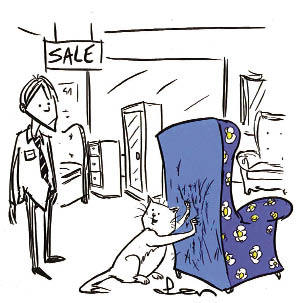‘My wife doesn’t understand me,’ the man said to his Jewish psychoanalyst. ‘I should be so lucky!’ was the reply. It’s a common complaint, not being understood. Yet surely only the most shameless would like others to know us exactly as we are or as we know ourselves. This is one reason some writers shrink from the prospect of having their Life written. Kipling called biography ‘the higher cannibalism’, and tried to pre-empt one by writing his own decidedly reticent memoir, Something of Myself. Something indeed, but not a lot. Subsequently, his widow, Carrie, burned letters and other papers; their daughter, Elsie, suppressed Frederick Birkenhead’s biography without giving a reason, and when at last consenting to one, tied its author Charles Carrington’s hands. One sees their point. In life Kipling concealed everything but his opinions; why should a biographer be free to expose what had been kept hidden from view.
Thomas Hardy, equally shy of the world’s gaze, adopted a different stratagem. He wrote his own biography, to be published posthumously under his wife’s name. The device failed to choke off the higher cannibals. He has repeatedly attracted the attention of biographers. We know much more about Hardy than he wished to be known.
Auden went further:
Most genuine artists would prefer that no biography be written. A great deal of what passes for scholarly research is an activity no different from reading somebody’s private correspondence when he is out of the room, and it doesn’t really make it morally any better if he is out of the room because he is in his grave.
This is Auden in his best pontifical vein. Yet he must have known that he would himself be the subject of a biography, and indeed his friend Charles Osborne wrote a frank and sympathetic one only a few years after the poet’s death. Did this have Auden birling in the grave? Somehow I doubt it. He might, I suppose, have been more offended if no one had thought his Life worth writing.
Many, probably most, authors accumulate piles of paper. They keep diaries or notebooks. They write, and receive letters, often copying their own, and file them or stuff them into drawers and boxes. I would guess that many now print e-mails, both those they send and those which arrive in their inbox. If a tempting offer comes, they sell their papers to a university library, usually an American one. Those who attract no such offer sigh for one, in the hope that it might repair their bank balance, provide for their old age, and secure their posthumous fame.
‘So long as men can breathe or eyes can see,/ So long lives this, and this gives life to thee’. ‘Exegi monumentum aere perennius’. Poets were once content to believe that their verses alone would bring them immortal fame. Now perhaps they are less certain, for we must all now be aware of our inheritance: the Great Unread. Who now reads Spenser or Dryden except university professors and, perhaps, their reluctant students? If you wish to be remembered for even one generation after you are dead, appoint a biographer and make sure he has material sufficient for a fat book.
And yet how inadequate most biography is, how inevitably inadequate. It is all right, as Auden remarked, for a man of action — ‘a ruler, a statesman, a general’, for in his case ‘the man is identical with the biography’. His or hers was a public life, and that may indeed be satisfactorily written. Much, of course, will be omitted, for even rulers, statesmen and generals have private, and happily hidden, lives. Moreover, they have, or may have, their secret life of the imagination, which they must often wish to take undisclosed to the grave.
The case of the artist is different. There is a gulf between the life lived from day to day, and the work done. The relationship between life and works is, Auden wrote, ‘at one and the same time too self-evident to require comment — every work of art is, in one sense, a self-disclosure — and too complicated ever to unravel’.
This is surely true, and if the artist reveals himself in his work, he does so either unconsciously, often realising only years later how much he had given away, or he continues to hide behind a mask. He wants to be known and yet remain unknown, and the more subtle and scrupulous the artist, the more likely it is he will evade any biographer. Inasmuch as the biographer offers no more than the ‘higher gossip’ (which is the form cannibalism takes today), the artist distrusts and despises him; and yet, such is the longing for posthumous fame — fame of which he will sadly remain ignorant — that he will arrange to make materials available for a biography; or even, like Beerbohm’s Enoch Soames, sell his soul to the devil. And who knows? He may bring off the desired double: to be remembered but still escape full understanding.






Comments